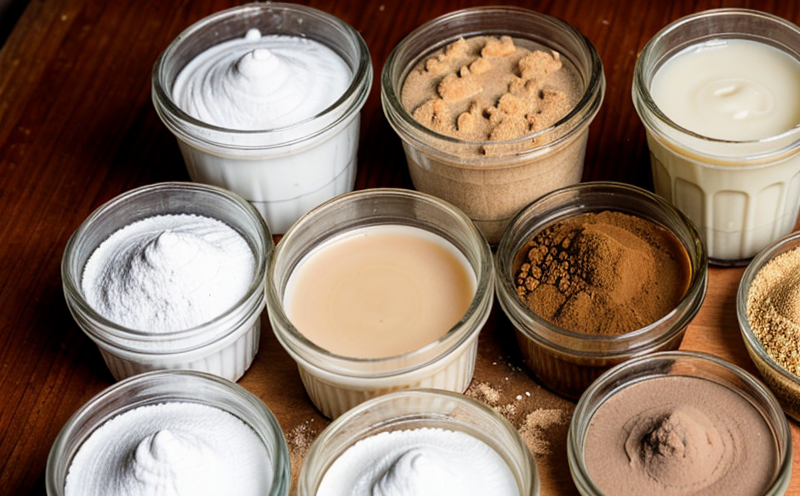EN 16524 Detection of Spoilage Molds in Fresh Produce
The European standard EN 16524 outlines a method for detecting spoilage molds in fresh produce, which is essential for maintaining food safety and quality. This standardized procedure ensures that mold growth, particularly in fruits and vegetables, can be accurately identified to prevent contamination and ensure product integrity.
Food safety is paramount in the global food supply chain, especially concerning fresh produce. Moldy products not only affect consumer health but also cause significant economic losses for producers and retailers. Therefore, implementing a reliable detection method like EN 16524 is critical for maintaining consistent quality standards.
The standard specifies detailed procedures for sampling, specimen preparation, and analysis using culture-based methods to identify spoilage molds. It ensures that the testing process is reproducible and accurate, providing confidence in the results. This helps food companies comply with international regulations and maintain their reputation in the market.
Sampling plays a crucial role in this method. Fresh produce samples must be collected from various parts of the produce to ensure representativeness. These samples are then prepared according to EN 16524 guidelines, which may involve washing, cutting, or grinding the produce into smaller pieces suitable for mold growth.
The culture-based approach used in this standard involves inoculating the prepared specimens onto specific media that promote mold growth. This allows for the identification of different species of molds based on their colony morphology and pigmentation. The method also includes a step-by-step procedure for incubation, observation, and enumeration of colonies.
Accurate identification is key to determining whether the detected molds are spoilage types or harmless ones. Spoilage molds can cause significant quality issues in fresh produce, leading to product rejection and waste. Therefore, understanding which mold species are present helps in implementing appropriate corrective actions.
The standard also emphasizes the importance of proper documentation throughout the testing process. This includes detailed records of all sampling steps, preparation methods, incubation conditions, and observations made during analysis. Proper documentation ensures traceability and reproducibility of results, which is vital for compliance with regulatory requirements.
Implementing EN 16524 not only enhances food safety but also supports sustainable practices by minimizing waste through early detection of spoilage molds. This proactive approach helps reduce the environmental impact associated with wasted produce and ensures that resources are used efficiently.
- Environmental and Sustainability Contributions:
- Detecting mold early can prevent large-scale food wastage, reducing the carbon footprint associated with producing, transporting, and disposing of spoiled products.
- By ensuring product quality, EN 16524 helps reduce energy consumption in storage facilities by minimizing the need for temperature control measures to preserve moldy produce.
Why It Matters
The importance of detecting spoilage molds cannot be overstated, especially given the increasing demand for fresh produce worldwide. Mold growth in fruits and vegetables can lead to significant economic losses if not detected early.
Consumers expect high-quality products that meet strict safety standards. Detecting mold using EN 16524 ensures that only safe and wholesome food reaches the market, thereby protecting public health. This standard also helps maintain customer trust by ensuring consistent product quality.
In addition to safeguarding consumer health, early detection of spoilage molds can prevent large-scale waste in the supply chain. By identifying moldy produce at an early stage, producers and retailers can take corrective actions such as reconditioning or discarding affected products before they reach consumers.
Compliance with international standards like EN 16524 is essential for food companies to meet regulatory requirements and maintain their global reputation. This standard provides a reliable method for detecting spoilage molds, ensuring that food safety remains a priority in the industry.
In conclusion, implementing EN 16524 not only enhances food safety but also supports sustainable practices by minimizing waste and ensuring efficient resource use. By following this standard, food companies can ensure product quality, maintain consumer trust, and comply with international regulations effectively.
Applied Standards
The European standard EN 16524 is widely recognized for its reliability in detecting spoilage molds in fresh produce. This method is consistent with other international standards such as ISO and ASTM, ensuring that the testing process adheres to global best practices.
EN 16524 provides a comprehensive approach to mold detection, covering all aspects from sampling to final analysis. It specifies detailed procedures for preparing specimens, inoculating media, incubating cultures, and observing colony growth. This ensures that the results are accurate and reproducible.
The standard also emphasizes the importance of proper documentation throughout the testing process. Detailed records of all steps taken during the procedure help ensure traceability and consistency in results. Compliance with EN 16524 is essential for maintaining product quality and meeting regulatory requirements globally.
By adhering to this standard, food companies can demonstrate their commitment to food safety and quality assurance. This helps build trust among consumers and ensures that products meet international standards, thereby enhancing the company’s reputation in the market.





